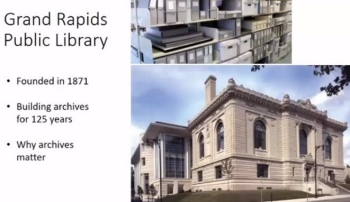Web Archiving for Public Libraries: Self-Paced Course
“The Web was not designed to be preserved. The average life of a Web page is about 100 days.”
–Brewster Kahle*

online course.
The fact that the news, events, celebrations and even disasters that take place in our local communities are by now almost solely documented online is itself no longer new information. For many years, the decline of print news has paralleled the increased use of websites, blogs and especially all forms of social media by local government, businesses, sports teams, community organizations, and individuals, to share news and information, plan and document events, and communicate with friends, family and neighbors. The result is that vastly more information and documentation about local communities is available in real time than ever before, while at the same time less and less is being preserved for the future.
Public libraries have played a central role in preserving the historical record of their communities by archiving local newspapers and other print publications. But while other institutions and some types of libraries have recognized and reacted to this shift to online by implementing web archiving activities, public libraries have largely fallen behind, either continuing to archive print resources that still exist, or as those go away, they are no longer preserving the local historical record. While many likely do so with the assumption that “nothing on the Internet ever goes away,” that is simply not true. While there are large scale efforts, such as the Internet Archive, attempting to preserve as much of the internet as possible, they cannot catch everything, and small, locally relevant websites are especially vulnerable to disappearing, taking their content with them.
A new course was designed under the Community Webs program, an IMLS-funded grant to the Internet Archive. The program provided instruction and support to public libraries of all sizes in creating their own archives of locally relevant web content. Library staff learned to think of web content as just one more facet of their library’s collection development practices, and found it allowed them to fill the holes left by disappearing physical media, while at the same time preserving whole new areas of local community life that were not possible to archive before the internet.
Web Archiving for Public Libraries is a 2-hour self-paced course that incorporates content created for that program as well as the experiences of the participating libraries, to introduce public library staff to the concepts, opportunities, and tools of web archiving.
